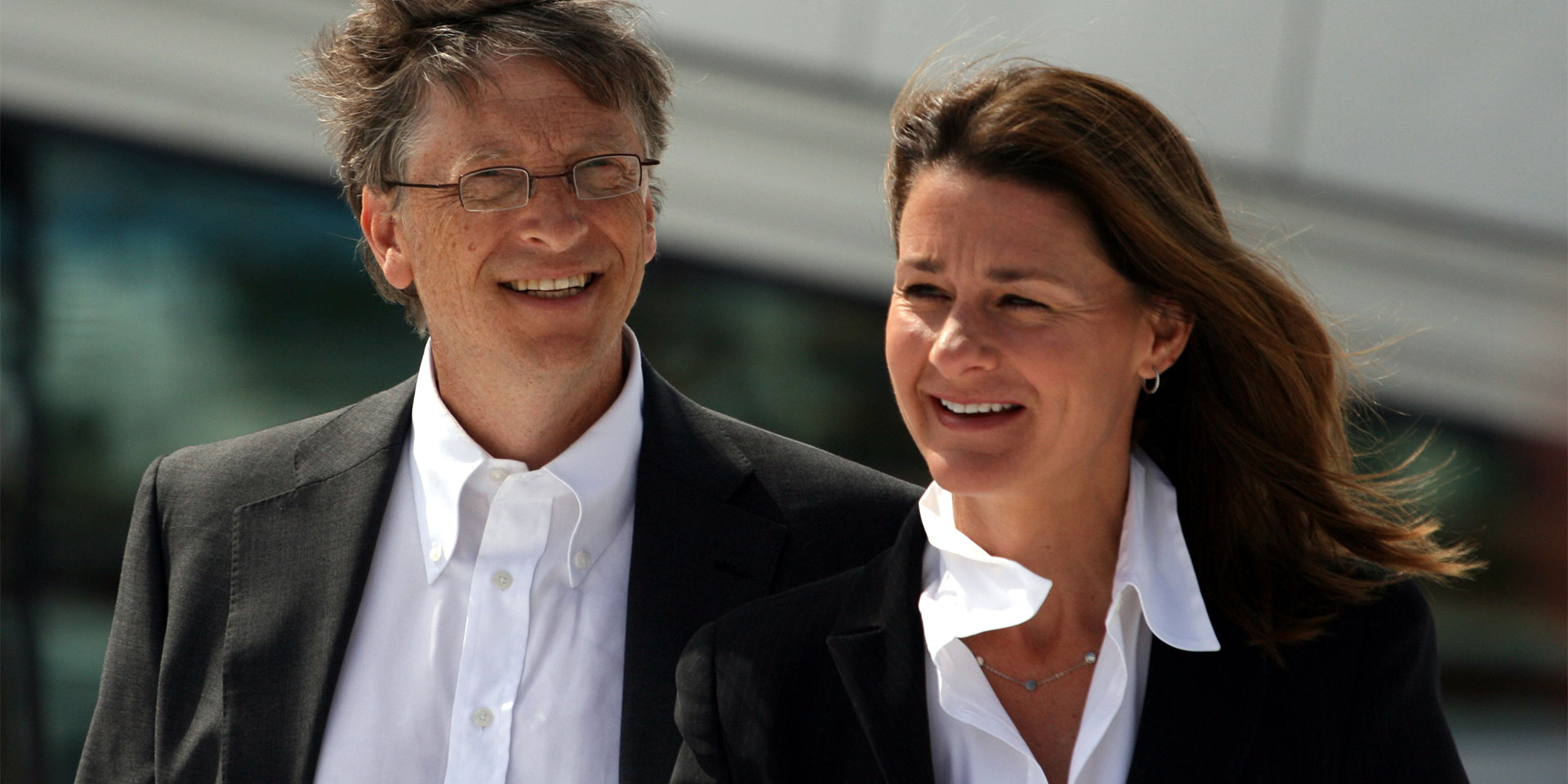After 27 years of marriage, billionaire couple Bill and Melinda Gates publicly announced their divorce in May, sending shockwaves across the globe.
The split comes just two years after Microsoft co-founder and philanthropist Bill posted a video of him cutting their silver anniversary wedding cake, to which wife Melinda responded, “the last 25 years have taught me just how full a heart can get”.
The world-famous couple, with a net worth of around $US124 billion according to Forbes, have three children between them and together founded the Bill and Melinda Gates Foundation, which has donated more than $50 billion dollars to charitable causes since it was founded in 1994.
Although I have never met Bill or Melinda Gates, news of their divorce piqued my interest and concern more than I expected. I feel sad for the family who must be hurting deeply at this time, but I also have an insatiable desire to know the reason for the split. After all, Melinda’s joint statement that their marriage was “irretrievably broken” and they were moving on to the “next phase of our lives” seems to defy logic when there is evidence of once mutual love, a stable family unit, boundless wealth and profound shared purpose.
And it’s not just my interest that’s been piqued by news of their divorcing; the announcement has spun the media into a frenzy.
Bad news, bad reasons
“China can’t stop talking about the Bill and Melinda Gates divorce,” announced 9News, with rumours circulating that a young Chinese interpreter was to blame for the split. Other news outlets pinned the cause to Bill’s close relationship with convicted sex offender Jeffrey Epstein, suggesting that the relationship may have begun to break down in 2019. Others proposed the divorce could be due to the coronavirus pandemic, forcing them to live in closer proximity, or the opposite—that the couple’s separate and hectic schedules forced them apart.
And it’s not just mainstream news outlets casting theories and aspersions as to the cause of the split; it’s also—you guessed it—conspiracy theorists. One far-right group has suggested Microsoft founder Bill Gates was part of an elite group involving sex trafficking (that Donald Trump was trying to save the world from), or that he was the leader of an alleged child trafficking ring. Other wild theories suggest he engineered the Covid-19 vaccine to implant biometric microchips into people to control the global population—a move that Melinda could understandably want to steer clear of—while others blame Melinda for having an affair with US leading infectious disease expert Dr Anthony Fauci.
The abundance and contradictory nature of these theories—suggested by news outlets and conspiracy theorists alike—is astounding, especially given that the couple have purposely kept the reason for their divorce private. But rather than respecting this privacy, the secretive nature of the split has only sparked increased media attention.
While the public and media have reacted strongly to the Gates’ divorce scandal, other events have attracted similar attention in the past 12 months: Prince Harry leaving the royal family, the conviction of Cardinal George Pell being overturned, Joe Biden’s presidential victory and the origin and cause of the Covid-19 pandemic. For want of better explanations for their occurrence or due to being shrouded in secrecy, each have birthed spicy headlines, wider debate or full-blown conspiracies.
Is this phenomenon a result of media companies trying to stimulate more revenue, or just bored people wanting something to gossip about? Or maybe it highlights a widespread addiction to bad headlines? While the answer could easily be YES to all, one plausible explanation can be traced much, much deeper—down to an intrinsic human desire to know why.
Why do we need to know why?
The intrinsic human desire to know why is evident from early childhood. Cue the scene: a family is driving to the beach, their youngest child looks out the window and says, “Mummy, why is the ocean blue?” The mother explains, “Because the ocean reflects the sky, honey”. Unsatisfied, the child replies, “But why?” The mother says, “Because the light bounces off the water”. Again, the child asks, “Why?” Frustrated, the mother responds, “Ugh, I don’t know why! Ask your father”. And, naturally, the cycle repeats. “Dad, why—”
Humans are meaning-seeking creatures. We seek not only to know the reason for daily phenomena, but also strive to find meaning in our lives by adopting—consciously or unconsciously—an overarching worldview or sense of purpose. Some turn to religion to satisfy this craving, some to politics, most seek to obtain wealth, status or success, while others find solace in conspiracy. This question of why is the impetus that drives nearly everything we do, including how we read the news or interpret life’s events.
Safe to say, then, that as meaning-seeking creatures, we naturally inject our own whys into news headlines—especially those that we struggle to accept, and those that are status-quo shaking or shrouded in secrecy.
In 1972, psychologist Jerome Kagan confirmed this, his research showing that people naturally become highly motivated to find concrete explanations when they can’t immediately figure out why something has happened. He even considered it one of the most prominent determinants of human behaviour. Later, social psychologist Arie Kruglanski coined the term “cognitive closure” as the desire for individuals to seek firm answers to questions and avoid ambiguity. In other words, psychologists have found that when a person doesn’t know the answer to a question, they develop the need to know, and as quickly as possible.
Cognitive closure is especially strong in times of crisis or perceived crisis. In a 2010 experiment, Kruglanski and colleagues designed an experiment where participants were shown a seven-minute slideshow. One was about the benefits of working at Google, while the other was about the 9/11 attacks. They then completed a “Need For Closure Scale” (NFC) self-assessment, which asked questions like, “in a case of uncertainty, I prefer to make an immediate decision” or “any solution to a problem is better than remaining in a state of uncertainty”—and then they were asked to rate their response on a scale of one to five. In short, results found that watching the 9/11 video—even in the absence of a crisis environment—was enough to trigger a heightened need for cognitive closure.
Kruglanski elaborated on this in further research (1996), where he found that cognitive closure occurs in two main stages: seizing and freezing. In the first stage, people are drawn to “seize” information that fits their theories and provides closure as quickly as possible. Driven by this urgency, they often fail to verify or overlook the validity of information. Then the second stage—freezing—occurs, driven by a need to preserve this newfound closure and safeguard it for as long as possible.
In other words, when we don’t understand something, we will look for information to help explain the situation and then “freeze” it to establish a sense of security, closing us off to new ideas. This psychological tendency explains why the media and public so readily sink their teeth into negative headlines and contrive gossip: it’s because humans naturally seek cognitive closure, regardless of the quality of information needed to make that possible, and especially in situations that mirror a “crisis”, like the Gates’ divorce.
Inaccessible and unfamiliar
If Bill and Melinda decided to announce the true reason for their divorce to the press tomorrow, many people wouldn’t believe them, preferring to cling to their preconceived theories than change their mind and accept new information.
This reaction, I have discovered, stems from an inaccessibility to, or unfamiliarity with, subject matter. It’s easy to read news of the Gates’ divorce—not knowing the family at all—and think, “One of them must have had an affair.” But if I was Bill Gates’ best friend—someone who knows him, assumedly trusts him and spends time with him often—I’d have far less informational gaps to fill in, much less room to conspire or criticise (assuming Bill isn’t directly at fault, of course).
While I can’t achieve cognitive closure by personally asking Bill or Melinda Gates why they got divorced, I can ask the man next door why he always leaves his garbage bin open. Rather than assuming he just wants to spite me, I have the capacity to talk to him, listen to his story and find common ground. And yet so often in similar situations—due to emotional exhaustion, awkwardness or laziness—I don’t.
At this point, it’s important to mention the effect that understanding why can have on our emotional state. If you’ve been stuck in a traffic jam for an hour, your frustration will soon melt into remorse at discovering the cause: metal twisted and curled around a tree, a corpse being covered by white sheets as paramedics take off bloody gloves and wipe their foreheads. In the same way, finding out that your neighbour leaves his bin open so the homeless neighbourhood cat doesn’t starve would likely alter your emotional state—and by extension, the way you treat him.
This space between not knowing and knowing—the time between discovering information and coming up with a why that fits the bill—can transform our whole life experience. In times of uncertainty, we have the power to decide whether to fill those emotional gaps with negativity and criticism, with positivity and goodwill, or to even fill them at all.
While this isn’t a plea to trust and have good-will toward everyone (use your brain, employ human decency, be safe), it is an encouragement to be aware of the information you’re injecting into the gaps of your understanding. Racism, cultural tension, religious bigotry or judgment—all these things stem from not knowing why and injecting negative assumptions into those gaps. It’s also a petition to embrace the unknowns rather than seeking constant cognitive closure. The latter can lead to a life of resentment, comparison, judgment and anxiety, whereas being content to leave the question opens our hearts up to those things we don’t understand.
Faith: living the question
Religion operates in the unknown realm. Faith, a word that Oxford Languages defines as “a strong belief . . . based on spiritual conviction rather than proof”, by its very nature, is a choice that leaves unanswered questions; unanswered whys. While the Christian Bible holds answers to life’s big questions like, “Why am I here?” or “Why is there suffering?”, and provides tangible evidence for the existence of God, the inevitable gap between the physical (world) and the spiritual (heaven) will always leave us feeling somewhat dissatisfied.
Given the high barrier to entry into religion—the complex holy texts, cultural practices and traditions—it’s often easier to come up with answers to life’s big questions on our own than to explore evidence found in faith texts. It’s easier to seize and freeze. This is especially true if we’ve had bad experiences with religion—or religious people—in the past. Many people approach religion with gaping why gaps, without knowing much about it at all.
While this is understandable, whether it be religion, race, relationships or ideologies, we close ourselves off to so much beauty, meaning and purpose by holding preconceived notions—by seizing and freezing—before we have a chance to investigate and look at the evidence objectively. But what is beautiful about God—unlike spicy news headlines shrouded in secrecy—is that He makes Himself accessible to us. He has given us information in the Bible—that even aligns with historical and archaeological records—and created this intricate world in which we live. And He promises us that we will find Him if we truly seek Him (Jeremiah 29:11, NIV).
Sure, God might not be able to speak to us directly—but rather than jumping to conclusions and immediately assuming that He is bad as a result, I encourage you to live the question. There are logical and complex reasons why, but it takes a while to find them. Not knowing Bill Gates, it’s easy to jump to conclusions and fill in the why. Not knowing God has the same effect. But the more you spend time with someone, the more barriers begin to break down and information starts to piece together in a beautiful tapestry. And I promise—the God tapestry is the most intricate and beautiful one of all.
So rather than negatively judging God’s character, other races, cultural groups or inaccessible people before we get a chance to truly know them, let’s learn to live the question and keep an open mind. Let’s make the effort to talk to unfamiliar people rather than jumping to conclusions.
Divorce is hard enough—let’s not be divorced from reality, too.
This artcle first appeared on Signs of the Times Australia.
Maryellen Hacko is assistant editor for Adventist Record magazine. A talented artist, musician and YouTuber, she lives with her husband in Sydney, Australia.



















